08/05/2015
Alyssa's Onward Israel Experience
- Share This Story
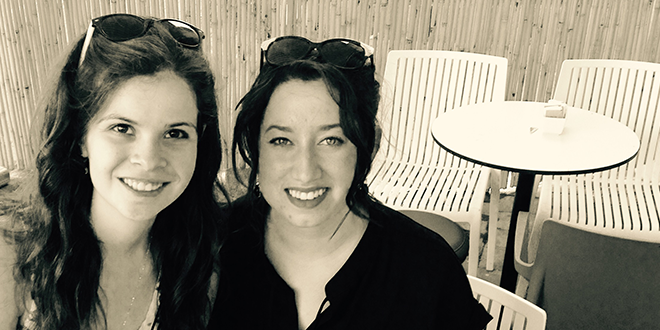
Meet Alyssa. She’s been to Israel before, but she’s ready to go back again – this time, for the entire summer! Alyssa is a participant with Onward Israel Cleveland, an 8-week program where students ages 20-25 live and intern in Tel Aviv. Follow Alyssa’s journey on this blog each week, and to learn more about all Israel opportunities, visit our I-Connect Page.

by Alyssa Williams
Week 1
I am back in Israel for the summer!
The shock of this trip really hit me on the way to the airport. I have put so much effort into planning and saving to return to Israel. This adventure has pounced on me in the past few months. Now that I am settled in my cousin’s great apartment, the surrounding feels familiar, as if I left yesterday, not nearly three years ago. Hopping on a plane to travel someplace so geographically distant in several hours has distorted my sense of place. I don't truly feel an ocean away from Cleveland, but I imagine the distance will settle. I have been looking forward to being closer to this country that is so dear to my heart for a long time. Most of all, I feel an immense appreciation for those who helped make this experience possible through guidance, friendship and kindness.
Welcome! أهلاً و سهلاً ברוכים הבאים לישראל
From my first moment in the Tel Aviv airport it was striking how different I am from the last time I visited Israel. I saw Hebrew and Arabic characters next to each other and consciously noticed that the Arabic message was a greeting of welcome, but I still cannot read the Hebrew. It made me happy to be welcomed and sad that I have not yet learned the language of the Jewish people. Now, I am ecstatic to begin the mini-Hebrew Ulpan my program offers. I cannot wait until I can order my own vegetables in the shuk (open air market). I've already learned a very important phrase, Ey-fo Shirutim, which means “Where's the bathroom?” Very helpful.
Who is This Woman?
I'm in Jerusalem, climbing onto a train alone and have a giddy grin on my face. “Who is this woman,” I thought with a rush of excitement and independence on my way to the shuk at 9:30 p.m. Yes, p.m. But don't worry mom. I was going there to meet Dara, a Kenyon Alum I've been emailing for months about interning in Tel Aviv and Kenyon culture surrounding the Israeli-Palestinian conflict. A man starts playing a recorder in the compartment next to mine. The air is electric with life and Middle Eastern character. I glide along with the train, absorbing the clinging of the falling shekels (Israeli currency) into the musicians bronze can garnished with a single red rose. I glide so gracefully that I miss my stop. Not to worry – Dara meets me at the next one. So I missed one stop. I can still handle this city thing.
The Shuk's Dark Side
Dara and I stroll to the shuk, immediately in intense and lively conversation. I am brimming with questions about life in Jerusalem, her work as an “entrepreneur of peace,” and Aliyah (return to Israel). We pass by gate after gate of bold and rhythmic music and street art, and settle down at a moderately loud and over-priced shuk bar. I'm not used to city prices yet either. We skip from topic to topic. Making Aliyah, joining the army (or not), lifestyle, living wages, Kenyon professors, and campus culture around the conflict.
From Cow Pastures to Honking Horns
Dara explained why she made Aliyah and why she is now leaving Israel to live in the states. I explained how isolating Kenyon has become for someone who takes the conflict personally. Very early on in our conversation it became obvious we could talk until daylight. An hour in, I was comfortable enough to share how I am terrified to move into an apartment in the middle of Tel Aviv tomorrow. Most of the year, I can walk to a cow pasture faster than a traffic light. What if I can't even sleep because it is too loud? Her generous wisdom and openness made me feel like eventually everything will be okay. I will figure it out. After two hours of sharing, I do not have a single doubt in my mind that I have embarked on the most rewarding journey, an experience that terrifies me. Dara's wisdom is a blessing from Jerusalem.
A few moments captured

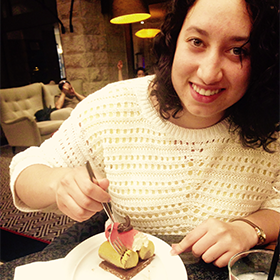
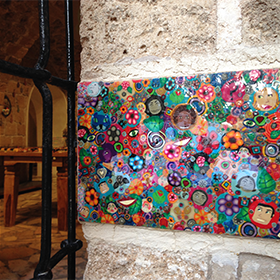
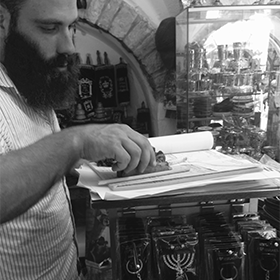
Week 2
First Work Week
Top Ten Moments
- Enjoying my five-minute walking commute to work. Of course the girl who goes to a liberal arts college where everything I need is within ten minutes of walking would have a miniscule commute. This means that every lunch restaurant that is convenient for work is convenient from my apartment.
- Underestimating how the “office” is really decorated like a home. I remember during my interview with Tom that she described the office has very homey feeling. I had my orientation sitting cross-legged on a couch with my coworker. People around the office are wrapped up in blankets and every table has a bowl of fresh fruit to nosh. I’ve never been in an office with so many computers that still feels like my living room.
- Really who needs shoes anyway? The first thing my trainer Paz did before going over the office structure with me was kick off her sandals. Someone came into the conference room to ask her a question (also not wearing shoes). This is so not an American office.
- Family style lunches. The first floor of our office has a huge wooden dining room table. I eat lunch with a minimum of eight other coworkers laughing and chatting delightfully, My first day there was about 15 of use scrunched around the table and people pulling up chairs around. Lunch is an all-inclusive event like a warm home rather than a lunch break.
- A mixture of Hebrew and English. I was assured during my interview that there was a balance of English and Hebrew speakers at the office. Still, I could only hope for the best on this account and man did I luck out. Because the company I work for is so international all of my coworkers can understand enough English for us to work together. Even better, there is a woman on my team that only speaks English to her coworkers and they speak Hebrew to her. This is fantastic because I always can tell what topic they are discussing and I am being exposed to Hebrew. Lunch can be a challenge because when Israelis get excited they tend to speak in Hebrew but everyone is very accommodating if I ask for a translation and normally the person sitting next to me will fill me in on the details.
- Never alone. My usual workspace is in a medium sized room with six desktops. There is always someone on my team there to answer questions. I normally cannot work without music and one of my coworkers plays a quiet variety. Thankfully, I like her taste in music. It’s a good blend of pop, acoustic covers, and some jazz. I also don’t mind not knowing Hebrew in this situation because I am not distracted as my coworkers chat around me. It’s kind of like white noise and I know when I hear English to perk my ears up because they are talking to me.
- Never micromanaged. At the same time as I always have someone to ask questions. I was set off on my own my second day. I ask for approval and double check my work with my coworkers but in general, no one is watching over my shoulder. This is a subtle and wonderful way that I am treated as an equal to my colleagues.
- #FREESPRESSO 2 p.m. is a very hard time for me. Espresso makes every day better.
- 4 p.m. ice cream breaks. “Hey Alyssa, want an ice-cream cone?”
“No. Way.”
“Yes, American, come upstairs…Milk Chocolate or Dark.”
“Always Dark, and this place is the best!”
“Welcome to Israel.” - Losing track of time while working. I always know I am where I am supposed to be when time “flies by.” I may be sitting in front of my computer most of the day but with the espresso, and ice-cream, and lunch commotion, and lounging on the conference room couch while drafting response emails to potential clients, I didn’t even notice is was 6 p.m. until my coworker walked out of the room.
“Shabbat Shalom Alyssa! See you Sunday.”
“Shabbat Shalom!
Week 3
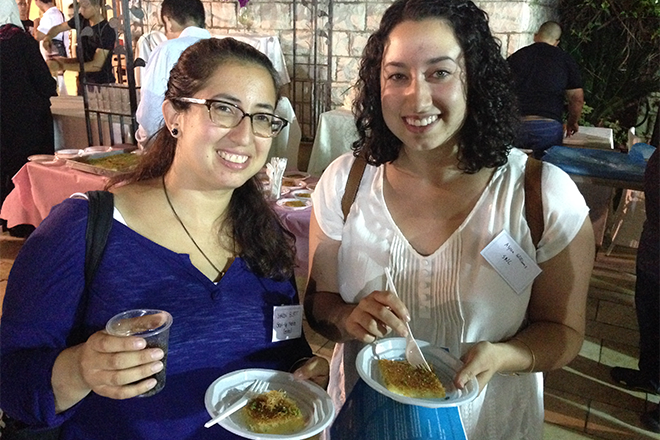
Exploring Nazareth Tech Conference
What is a conference?
This week, I attended the annual FoodTech Community symposium. The morning began with watching my bus drive by at 8:02 a.m. when it wasn't supposed to come until 8:04. Oops. Time to take a taxi.
My coworker and I are on a train soon heading towards Ashdod. I work on the train for about 20 minutes. Now I really am acting like a commuting work woman. We arrive at the station, take a group shuttle to a brand new building, and enter the "The Kitchen" a FoodTech incubator that just got off the ground. The day’s events included lectures from the support staff behind “The Kitchen” as well as updates about the current standing of the AgroTech and FoodTech industries. Moreover it is a general opportunity to mingle with a community and enjoy the food.
What is an incubator?
I attended a conference in Nazarth last week that showcased hi-tech Arab-Israeli start-ups. This week featured "The Kitchen,” another incubator focused on innovative technology regarding food production, distribution, packaging and more. These incubators and subsidized by the Ministry of Economy. They can be for profit or not for profit. Both designs are featured for providing infrastructure, mentoring, and resources to budding businesses and new teams of entrepreneurs. Some incubators require a percentage of equity in these new companies in-order for the startup to receive funding.
What is it like attending a Hebrew conference when you only speak English?
Everyone spoke in Hebrew, but the PowerPoint presentations were in English. This way I could always follow along the general subject and even take a few notes! IBM presented research about a Watson-powered cookbook and followed a tutorial. This portion was simple to understand. Living in a country where you don't speak the language requires a lot of intuition. Even more importantly, it requires a dedicated translator, in this case my sweet coworker, to make sure you don't get completely lost.
Week 4
Cleveland's (Twin) Sister City
From an aerial perspective, Beit Shean looks kind-of like Ohio in a mild drought.
Our weekend in Beit Shean started with gathering at a lookout point over the city. From this high perch, we could see the natural springs awaiting us below. The fish farms and irrigated farmland sprawls out across the land reaching towards the mountains of Jordan. Human hands have molded the land into geometric shapes. Nonetheless, it is strikingly beautiful to witness so much growth in what should be a desert.
We waded through refreshing spring water.
Next, we ventured into the serene and natural springs. There won't be any pictures of this adventure; we all got drenched. Most of the trip at this point has been running between my internship to group meetings, to work, to a tiyul (hike), and back again. The cool mucky brown water reminded me of the muddy Metroparks of Cleveland in the spring. What's more, this was probably the first moment in the trip where each Onward participant walked at a comfortable pace for himself or herself. The water was particularly refreshing because it crisply dissolved the cliques that formed in our group. I give major props to Onward Cleveland for branching out from the groups of people we knew when the trip began.
An electric evening.
The evening we spent in the guest house brought me back to Nesiya. I wandered up to a rooftop patio and mediated on the lights of Jordanian villages gracing the distant hills. I remember the magic of the night sky and rolling city light my first trip in Israel. A large group of us found our way onto the roof of a hostel whose name escapes me. It was an electric evening. I could have sat up there forever, but the Madrich threatened to lock us up there, forcing us to return unwillingly to our rooms. In Beit Shean I found that corny bliss again and I burst into tears, unforgettable tears of joy.
Stale city development goals. Time to get creative.
As great as it feels to share the picturesque moments, let's get down to business: politics. To begin, I want to be clear, I am very loyal to Cleveland and I want to contribute greatly to its success. This is exactly why I am conflicted about Beit Shean's effort to bring young people and industry into their small city. In terms of city development, this is a pretty antiquated method at nurturing economic growth. Why not improve upon the method? Instead of trying to get young professionals to stay in Beit Shean, why not incentivize these young adults to move back to the city to raise their families? Create a commuting town where it is cheap and convenient to get to Haifa to work and return home in the evening. The city of Curitiba in Brazil has had great success with this model. They use their city center for business and the surrounding area stays green, homes have privacy and communities flourish. Similarly, Cleveland in a position to make a dynamic transition into an eco-city. Relative to other cities in the U.S., downtown Cleveland is relatively unpopulated and vacant. It might be a good idea to keep it that way. Create more parks and pedestrian walkways downtown and improve public transit to get to the city.
In the Spring of 2016 I will be studying City Development and Politics in New York, Cape Town, Ahmedabad and São Paulo. Learning about Beit Shean's efforts and hypothesizing about Cleveland's future development has made me even more ecstatic to be studying abroad for an entire semester.
Branching out in an unexpected setting.
I made a new friend, Adele, in Beit Shean. She speaks very little English but still, we managed to probe at some deeper questions. We talked about aggressive men, family, cultural values, and how much she wished she was living in Tel Aviv. I can't remember the specifics of much of our late-night conversation but considering it filled several hours, I know we had a meaningful dialogue. I wish finding these kinds of connections were not as rare. Between the language barrier and only spending one night in Beit Shean, I was not expecting to meet anyone like Adele, but I am glad to say that we will keep in touch.
All in all, Cleveland's sister-city is more like a twin sister-city who made Aliyah many years ago.
A few moments captured

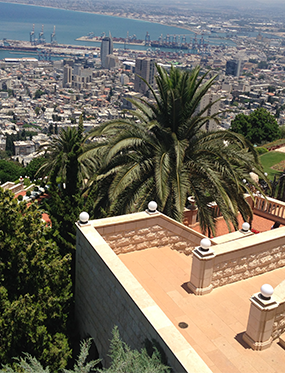
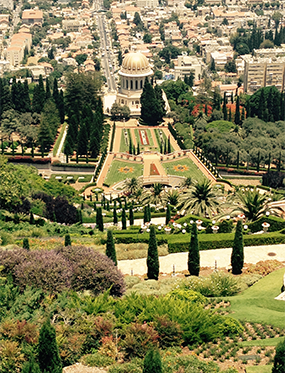
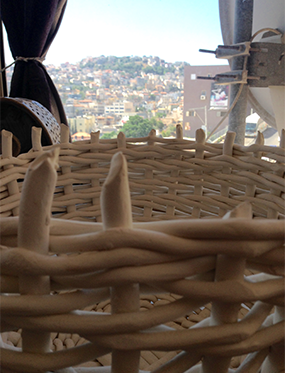
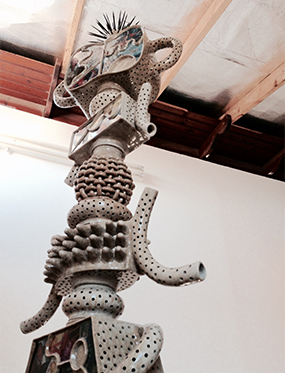
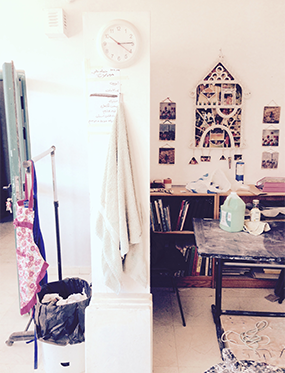
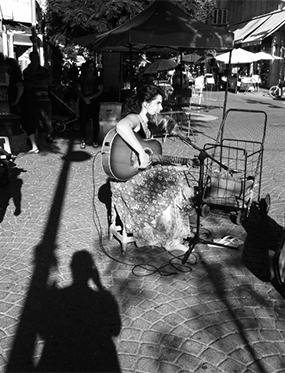
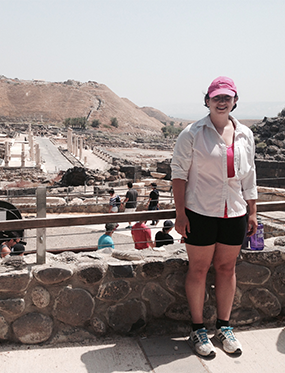
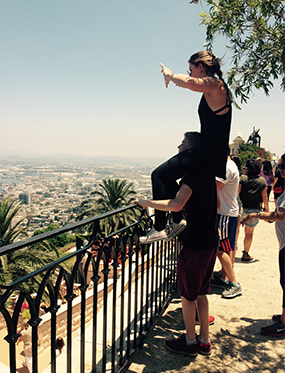
Week 5
An Israeli Casual Office
This week, I decided to write about what it is like working in an "Israeli Casual” office. This topic was inspired by a conversation with my dad about how I packed the perfect amount of clothing this summer. What follows are my personal opinions. Moreover, since I have only worked in one environment in Israel, I am certain that this evaluation is not universally applicable. Alas, the "Israeli Casual” dress-code is an interesting distinction from what my expected dress code would have been working in downtown Cleveland.
Definitions: Let's start off with a few definitions for those who are not aware of the vast difference between Israeli and American dress attire, as I see the two:
Business Casual:
Men→ Dress slacks, leather/suede dress shoes, oxford button down (long sleeve), possibly a tie, belt
Women→ skirt just above the knees, appropriate dress, pant suit, optional jacket, no cleavage, closed toe shoes
Israeli Business Casual:
Men → Nice jeans/cargo shorts, tee shirt/ polo, sandals/tennis shoes
Women → Nice Jeans/ casual dress, sandals
PRO: Less Laundry→ living in Israel you sweat. A lot. However, because the same outfit I wear to work is appropriate and comfortable for dinner and drinks in the evening or lounging around the apartment, there is no need to change after work; hence, less clothes to wash.
CON: Work is always on the mind→ It is easy to bring work home with you when the boundary of a dress code eroded. There is no feeling like putting on a jacket to prepare yourself for a big meeting and networking galore. When jeans and a nice tee are "work" and "play" appropriate, it is hard to differentiate the two modes and impedes on work-life balance.
PRO: Work is always on the mind→ working with startups so frequently has illuminated the idea that a great idea can strike at any point in time. Letting work seep into downtime fuels creative juices at all times of day. I find myself wanting to write down ideas for new ventures and strategies at very random times of day now. It's as if my work brain is always running in the background waiting for a bit of inspiration.
CON: Vague attire requirements→ When the dress code is "casual" it can be challenging to gauge how casual is too casual. Before I arrived in Tel Aviv I left nothing to chance and consulted my cousin and a few friends about work attire here. I learned that "casual" in Israeli really means "modest casual" in American. I don't see spaghetti straps, short hems, or tight tees and I was/am beyond excited to wear sandals everywhere.
Verdict: "Israeli Casual” is not for me in the long term but very convenient for the summer. Most of my friends know I am a huge fan of compartmentalization. As a very type-A person I know that I need physical distinctions between work and play, otherwise I will work too much. In the long term, I would rather have separate work and casual attire. On the other hand, I don't know how I would have packed separate outfits for business without exceeding my 50lbs baggage limit.
Ultimate Tackle Frisbee
In a similar vein, our company picnic included Birthright games, except they were all rougher, more aggressive, less organized, and significantly more entertaining. We ate through most of the pizza, fresh fruit, and tiramisu, and I finished out the evening drinking a beer while watching the sunset. This celebration of summer interns was a perfect example of how Israelis can often plan less but achieve more. The setting was thrown together last minute and I watched the sunset on a whim. Israelis are consistently demonstrating spontaneity, and after several weeks of assimilation in Tel Aviv, I have begun to internalize the benefits of wandering, not planning and getting lost.
A few moments captured

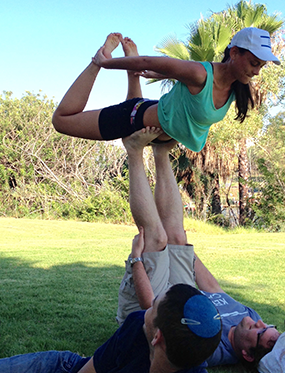
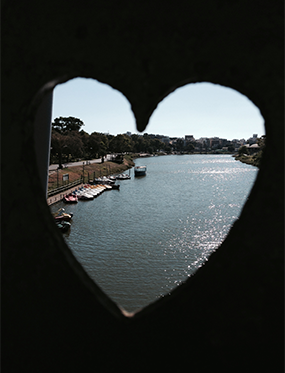
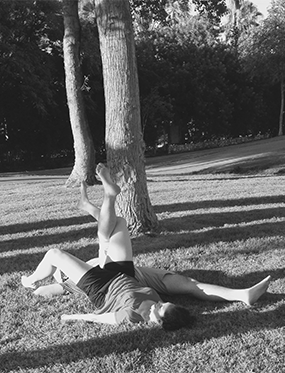
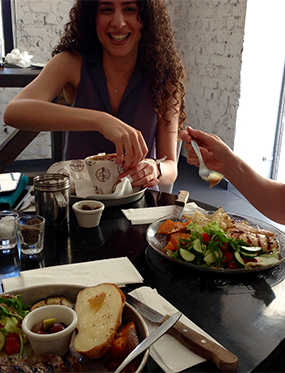
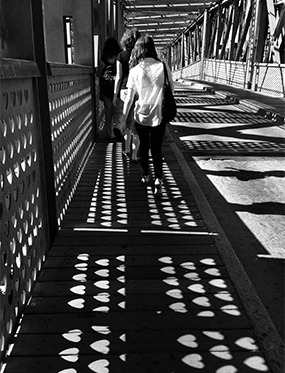

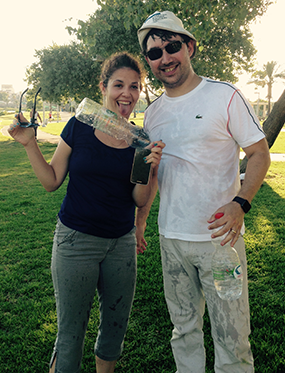
Alyssa Williams is a student at Kenyon College. She is currently interning at Start-Up Nation Central, a Tel Aviv based not for profit that aims to promote Israel through creating relationships between the Israeli innovation ecosystem and relevant ecosystems around the world.

